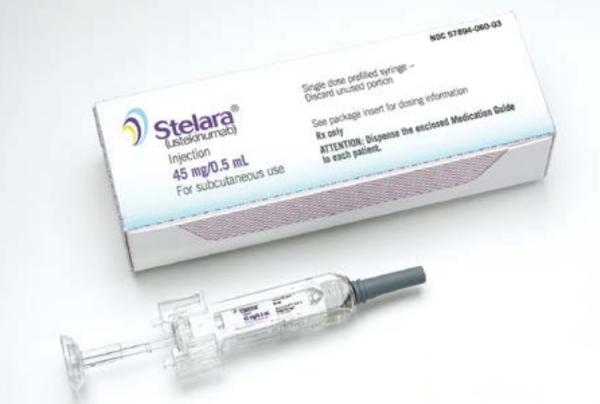Stelara Disease Interactions
There are 5 disease interactions with Stelara (ustekinumab).
Ustekinumab (applies to Stelara) malignancies
Major Potential Hazard, Moderate plausibility. Applicable conditions: Skin Cancer
In clinical trials malignancies have been observed in patients receiving ustekinumab. Patients should be monitored for non-melanoma skin cancers (NMSCs), particularly those patients who have had prior prolonged phototherapy treatment. Periodic skin examination is recommended for all patients, particularly those with risk factors for skin cancer. Caution should be exercised when considering ustekinumab for the treatment of patients with a history of malignancy, those who have a known malignancy, or in continuing treatment in patients who develop malignancy while receiving this agent.
References
- (2009) "Product Information. Stelara (ustekinumab)." Centocor Inc
Ustekinumab (applies to Stelara) posterior leukoencephalopathy syndrome
Major Potential Hazard, Moderate plausibility. Applicable conditions: Posterior Reversible Encephalopathy Syndrome, Pre-eclampsia/Eclampsia, Hypertension, Immunodeficiency
The use of ustekinumab may cause posterior leukoencephalopathy syndrome. One case of reversible posterior leukoencephalopathy syndrome (RPLS) was observed in clinical studies of psoriasis and psoriatic arthritis. No cases of RPLS were observed in clinical studies of Crohn's disease. Conditions with which it has been associated include preeclampsia, eclampsia, acute hypertension, cytotoxic agents and immunosuppressive therapy. Caution and close monitoring is advised when prescribing this agent to patients at risk of RPLS. It is recommended to administer appropriate treatment and discontinue therapy if RPLS is suspected.
References
- (2009) "Product Information. Stelara (ustekinumab)." Centocor Inc
Interleukin inhibitors (applies to Stelara) infections
Moderate Potential Hazard, Moderate plausibility. Applicable conditions: Infection - Bacterial/Fungal/Protozoal/Viral
There have been reports of serious infections, including infections with opportunistic pathogens, and reactivation of latent infections in patients receiving interleukin inhibitors. Treatment with these agents should not be initiated in patients with an active infection until the infection resolves or is adequately treated. Caution is recommended when considering the use of interleukin inhibitors in patients with a history of recurrent infections, underlying conditions which may predispose them to infections, or chronic, latent, or localized infections.
References
- (2009) "Product Information. Stelara (ustekinumab)." Centocor Inc
- (2009) "Product Information. Ilaris (canakinumab)." Novartis Pharmaceuticals
- (2014) "Product Information. Sylvant (siltuximab)." Janssen Biotech, Inc.
- (2015) "Product Information. Cosentyx (secukinumab)." Novartis Pharmaceuticals
- (2015) "Product Information. Nucala (mepolizumab)." GlaxoSmithKline
- (2016) "Product Information. Cinqair (reslizumab)." Teva Pharmaceuticals USA
- (2017) "Product Information. Tremfya (guselkumab)." Janssen Biotech, Inc.
Interleukin inhibitors (applies to Stelara) tuberculosis
Moderate Potential Hazard, Moderate plausibility. Applicable conditions: Tuberculosis -- Latent, Tuberculosis -- Active, History - Tuberculosis
Before initiating certain interleukin inhibitors, patients should be screened for latent tuberculosis infection with a tuberculin skin test. Do not administer these agents to patients with an active tuberculosis infection. Patients testing positive in tuberculosis screening should be treated by standard medical practice prior to therapy. Anti-tuberculosis therapy should be considered prior to initiation of therapy in patients with a past history of latent or active tuberculosis in whom an adequate course of treatment cannot be confirmed, and for patients with a negative test for latent tuberculosis but having risk factors for tuberculosis infection.
References
- (2009) "Product Information. Stelara (ustekinumab)." Centocor Inc
- (2009) "Product Information. Ilaris (canakinumab)." Novartis Pharmaceuticals
- (2015) "Product Information. Cosentyx (secukinumab)." Novartis Pharmaceuticals
- (2017) "Product Information. Tremfya (guselkumab)." Janssen Biotech, Inc.
Ustekinumab (applies to Stelara) immunizations
Moderate Potential Hazard, Moderate plausibility. Applicable conditions: Vaccination
Patients requiring non-live vaccination during a course of ustekinumab may not be protected from the vaccine as the immune response might not be sufficient to prevent the disease. It is recommended to be up-to-date with all required immunizations, as recommended by current immunization guidelines, before initiating therapy with ustekinumab. BCG vaccines should not be given during treatment with ustekinumab or for one year prior to initiating treatment or one year following discontinuation of treatment. Caution is advised when administering live vaccines to household contacts of patients receiving ustekinumab because of the potential risk for shedding from the household contact and transmission to patient.
References
- (2009) "Product Information. Stelara (ustekinumab)." Centocor Inc
Stelara drug interactions
There are 457 drug interactions with Stelara (ustekinumab).
Stelara alcohol/food interactions
There is 1 alcohol/food interaction with Stelara (ustekinumab).
More about Stelara (ustekinumab)
- Stelara consumer information
- Check interactions
- Compare alternatives
- Pricing & coupons
- Reviews (240)
- Drug images
- Side effects
- Dosage information
- Patient tips
- During pregnancy
- Support group
- FDA approval history
- Drug class: interleukin inhibitors
- Breastfeeding
Related treatment guides
Drug Interaction Classification
| Highly clinically significant. Avoid combinations; the risk of the interaction outweighs the benefit. | |
| Moderately clinically significant. Usually avoid combinations; use it only under special circumstances. | |
| Minimally clinically significant. Minimize risk; assess risk and consider an alternative drug, take steps to circumvent the interaction risk and/or institute a monitoring plan. | |
| No interaction information available. |
Further information
Always consult your healthcare provider to ensure the information displayed on this page applies to your personal circumstances.


